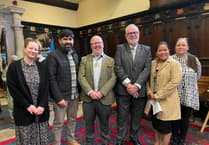‘RUN by a lovely team who have the children’s best interests at heart’ said one review of Little Monstarz, a preschool on Laburnum Road, Newton Abbot.
Yet Zoe Roseway, the preschool’s founder and manager, is struggling to make ends meet.
‘Everyone’s facing some kind of financial issue at the moment. We’re under those same pressures but the money that we receive from the government to look after our kids hasn’t gone up for the last two and a half years,’ says Zoe.
‘So the amount that we’re getting to look after children isn’t matching the costs of looking after them, let alone being enough to run a business.’
Like much of Britain’s social infrastructure, early years education is suffering from a debilitating combination of under-investment, rising costs, shortages of staff and increased demand.
Zoe’s work schedule starts anywhere upwards of 65 hours a week. She found that her take-home salary from her business was about £24,000, barely minimum wage. ‘My husband and I both own the nursery so we work it together which helps, but we’re taking a huge financial and personal hit.
‘My highest ranking member of staff, she’s got a degree in early years and all the debts around that, she’s highly qualified and she’s on £9.70 an hour which is ridiculous – but I can’t afford to pay her any more, not while still paying my own mortgage or taking away from the kids.’
Kate Perry, office manager of Woodlanders Pre-School in Ashburton reported similar issues: ‘The local government funding is not sufficient even before price rises to cover all our costs so fundraising and donations are really important to us. The national living wage has gone up and is expected to again in April which is a big concern for us as a charity employing 15 people. Materials costs have also jumped massively.’
The nursery’s only way to continue relies on charity grants and staff reductions, although staff are now hard to come by: ‘Recruitment has been impossibly difficult through COVID and this is still the case. We feel that early years qualifications have not been promoted or funded so there is a shortage of people with the relevant qualifications.’
And this squeeze is not passing on cheaper bills for parents. The OECD found that UK families spend about a third of their income on childcare, the UK having the second most expensive childcare in the developed world.
Woodlanders Pre-school is increasingly finding that parents are trying to keep childcare within the free 15 hours a week. Soon they worry prices will increase further. These pressures are further exacerbated by the after-effects of the pandemic. Zoe said: ‘We look after quite a few high-level needs children, but since COVID, the development of many more kids has deteriorated. A lot of children come in now and they can’t speak which means they need extra intervention to teach them to speak, communicate and socialise.’
Woodlanders reported similar experiences: ‘Children have not socialised through the pandemic so they are finding it harder to settle in when they join us and more support is needed. Many children have not had any contact from a professional until they come to us and so there are many needs that have not been addressed.’
Many in early years education feel that the underfunding and poor support stems from a lack of recognition of the importance of the sector both to enable parents to stay in their careers and as a key period of early development.
Zoe said: ‘I think part of the solution is recognising how important what we do is and funding it appropriately. Then we can pay our staff what they deserve, we can pass the saving onto the parents and so we can support the children in the way that they need.’
‘Last year we had a child who was diagnosed with autism. We were provided £2,000 extra a year to help him. When I had a meeting with his new primary school, they were going to get an additional £14,000 for him per year. Why is that the case? We just don’t feel recognised for the job that we do.’
On the topic, Anne Marie Morris, Newton Abbot MP, said: ‘I strongly believe that early years are crucial to giving every child the best start in life. I, therefore, welcome the doubling of free childcare for working parents of three- and four-year-olds and the introduction of tax-free childcare.
‘I am encouraged that the Department for Education has committed to providing £208 million in new funding for early years by 2024-25, as well as £150 million for the training of early years staff.’




